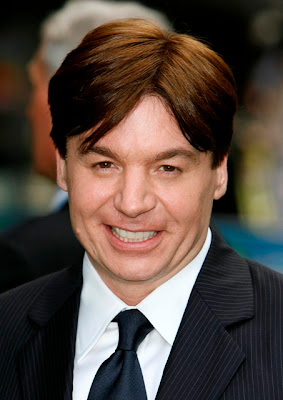Got some work to do so Zack Smith will be filling in for me on this fine Wednesday (or Tuesday evening for those of you early readers). He decided to read an older script that got a ton of heat back in the late nineties. It actually sounds pretty interesting. Might have to take a look myself. One quick thing before I hand over the reigns. People have been asking me about the logline contest. Don’t worry. It’s coming. I’ve had to change a few things but I’d look for the official announcement two weeks from now at the latest.
Twenty Billion
Genre: Comedy/Satire
Premise: A software mogul sees his stock fall after an accident, which threatens his mysterious plans.
About: In February 1998, Mike Myers was in talks to star in this Michael Tolkin-directed script, with Sydney Pollack producing. NOTE: This link gives away a plot twist that is not in the draft of the script I read, which is dated a month after this article was posted.
Writers: Michael Tolkin, Stephen Gaghan, Michael R. Perry
Details: 99 pages w/title page (March 4,1998)

The first few scripts I read for Carson let me down, so this time, I asked for an unproduced script I’d read about years ago. I was pleasantly surprised to find I enjoyed it a lot, though I’m not sure how well it would play if it were made today.
In Neil Gaiman’s Sandman, there’s this library of dreams that contains every book ever dreamed up. There’s the sequels that never were, half-finished thoughts, and the best-selling spy thriller you used to dream about writing while on the bus.
That’s how I feel about unproduced screenplays. They’re like the dreams of films that were never made, or at least haven’t been made yet. And if it’s an older script, like Harrow Alley or The Tourist, it’s also easy to think, “what if these had been made when they were originally written, with the stars and directors who originally wanted to do them?” There’s a whole digression about Harlan Ellison’s story “Jefty is Five” here that I’ll skip over.
The problem with older scripts is that while many have their reasons for their impressive reputations, the fact is, they also exist within the moment in which they were originally written.
Sometimes, when they’re finally made, they can be like Unforgiven, which Clint Eastwood sat on until he was old enough to play the vengeful William Munny. Other times, they can be like The Good Shepherd, which wasn’t bad, but still felt slow and overcooked after years in limbo.
This is all a preface to my review of Twenty Billion, which is a funny, well-written script that was an entertaining read. While parts of it still feel very topical, its subject matter – a satirical character study of a software mogul reminiscent of Bill Gates – doesn’t pack the punch it might have had a decade ago.
Gates remains a major public figure, but in the 1990s, when Windows broke through, he was a cause célèbre as he became the richest man in the world. Anyone remember the TV-movie Pirates of Silicon Valley? Ah, Anthony Michael Hall…and Noah Wylie weren’t bad as Steve Jobs neither.
Twenty Billion earned a fair amount of attention in the film press for its Gates-like main character in the late 1990s, and more than one outlet reported that Mike Myers was interested in playing the lead. What I read was a shooting script with numbered scenes, and there was even a website for a storyboarding company that listed this as one of the projects it worked on. In short, this script was ready for the cameras.
But for some reason, the picture never got made.
It’s tempting to speculate that Bill Gates pulled strings, or his Hollywood friends felt uneasy. The more likely answer is that Mike Myers decided to do an Austin Powers sequel instead.
Co-writer and planned director Michael Tolkin was previously known for adapting his novel The Player for director Robert Altman, and writing and directing two films of his own, The Rapture and The New Age.
He’s also done a number of rewrites and fixes, and at the time of Billion, he’d just done some work on the script for Deep Impact, the other asteroid-hitting-Earth movie (okay, so that one was a comet). Some reports on Billion list an Impact-like scenario, which didn’t show up in the script I read, as mentioned earlier.

I don’t know if the script originated with him (it might have been co-writer Stephen Gaghan, who went on to do Traffic and Syriana, or Michael R. Perry, who’s gone on to work on a number of TV shows). But the fact that Tolkin was going to direct makes me feel like his voice played the biggest role in shaping the final script.
Tolkin’s novels and screenplays love putting the screws to yuppies…well, maybe not Gleaming the Cube. His personal works usually take wealthy but immoral people who are gradually reduced to an increasingly desperate state by some sort of world-unraveling crisis. Unlike many of his other works, though, Twenty Billion has an oddly sweet, even whimsical quality behind its dark satire.
The premise is simple: Dennis Morton is the founder and CEO of the Interface Corporation, the most powerful software company in the world. His Interface software is used in most computers on the planet, and he’s about to launch a massive new initiative called “Mozart,” designed to take technological interactivity to the next level.
But things soon go wrong. Much like in the recently-reviewed Father of Invention, a glitch in an older version of the Interface software (in this case, altering the desktop to a specific font in combination with a specific shade of plaid), causes a major mining accident. Dennis, who can’t even remember to put on his shoes, is barely able to comprehend the human tragedy in front of him. He has a problem: He can’t let his stock fall.
Dennis, you see, has been meeting with fellow billionaire and mentor Henry Uberall as part of an inner circle of the ultra-rich determined to make the ultimate escape from what they see as a collapsing society. Plenty of online posts ruined what’s a major twist in the script, but suffice to say it’s both over-the-top outrageous and weirdly plausible. And for Dennis, who’s ill-at-ease with people in general, it’s the final step in separating himself from the rest of the human race.
Problem is, joining this elite group – along with his mom and a female companion he just hasn’t met yet – will cost him…well, see the title. So owning up to his screw-up with the software isn’t an option.
The crisis with the miners also serves as a window into the more unscrupulous side of the software industry. We find out, for example, that Dennis essentially kicked out the partner with whom he started his business, who now harbors passive-aggressive resentment toward him at the social events they frequent. More ominously, there’s the coder who knew there were bugs in the software, but was talked by Dennis into letting the program go out, and is now riddled with guilt and anger.
To handle his crisis, Dennis confers with corporate publicist Charlotte Walsh, who’s equally disappointed in his unwillingness to tell the truth, and charmed by the human being beneath the intimidating-but-lonely figure. Charlotte is married, but that doesn’t stop Dennis from pursuing her, and Charlotte’s husband is so turned on by the idea of hobnobbing in Dennis’ circle that he does everything but tell her to sleep with the guy.
About midway through the script, I realized that what was going on here was a Billy Wilder comedy in the tradition of The Apartment, mixing a light-hearted character study with something darker and more satirical. There’s one sequence, for example, where Dennis invites Charlotte to a late date at his ultra-high-tech house called “House.” At first, it’s silly – Dennis has his very own food court! – then moves into more poignant territory as we find out he has the actual attic from his childhood home inside this massive estate.
It’s also interesting how the script twists your expectations on how certain plot points will pay off. The plot with the disgruntled coder, for example, goes to a very dark place, and one where we kind of agree with the guy. Then it twists things around and makes us ask the question – do we really know what it’s like to be in charge of a billion-dollar company? Could we always be counted on to make the right decision?
Still, the script isn’t perfect. While I enjoyed the tonal shifts, some might find them a bit jarring. And the ending is almost absurdly upbeat, almost like the parody of Hollywood endings from The Player – though even the script makes fun of this. I could see where some readers might feel it’s a disjointed mishmash between real-world satire and a more traditional Hollywood comedy, but I enjoyed the script as much on a second reading as I did the first.
If it were made today, it’d need some updates – the gimmick where the film has a “home page” that takes us to different scenes (using such tabs as “Go,” “History,” etc.) is very late-1990s. And there are some of-the-moment references – for example, Dennis makes an apology commercial starring Jeff Goldblum, just as Goldblum was appearing in Microsoft commercials at the time. I’d forgotten that when I read the script, but it still played well – witness GM’s apologetic post-bankruptcy spots.
The biggest problem this script might have today is that, well, it’s about a billionaire with an excessive lifestyle. That might not play to today’s audiences. And, as I said earlier, a Bill Gates parody might have felt relevant and edgy in the late 1990s…not so much these days.
Would Tolkin have been able to establish the right tone and visual style to bring this to life? Would Mike Myers have been able to dial it down for the role of Dennis? Would this have been the rare satire that played to a wide audience? The only real indicator we have of what Twenty Billion could have been is the script. And it’s a pretty good script…though its moment may have passed.
Script link: Twenty Billion (If you are the writer or copyright holder of this script and would like it taken down, please e-mail me at Carsonreeves1@gmail.com and I will do so immediately)
[ ] What the hell did I just read?
[ ] barely kept my interest
[ ] worth the read
[x] impressive
[ ] genius
What I Learned: Though Dennis is an internal character, we’re able to learn a lot about him by seeing him interact with a wide variety of other characters (even his house). It’s the basic technique of revealing character by putting him in situations with people who see him differently, and seeing how he reacts. Also, while I’m not sure if others felt the same way about the tonal shifts as I did, for me they showed that combining elements of comedy, satire and darkness in a script provides an opportunity to really surprise the reader when something dramatic pays off in a humorous way, or something silly turns into a more emotional moment.

